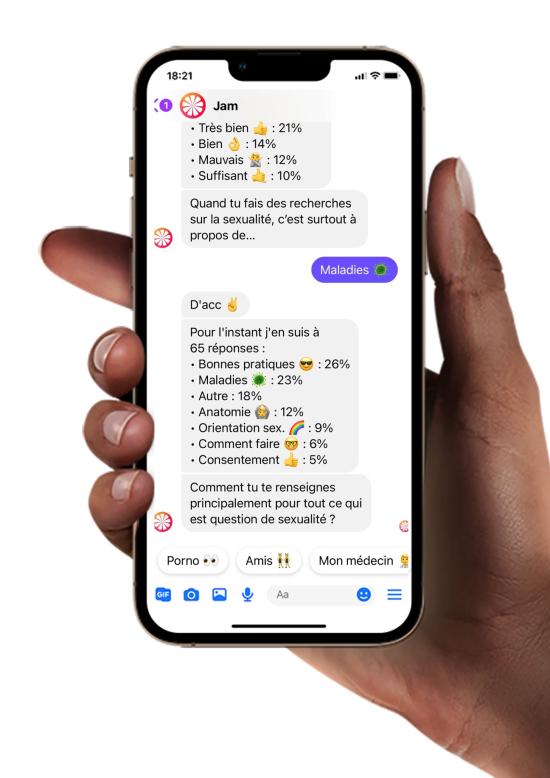
How do 15-25 year-olds find out about their sexual health?

To gain a better understanding of the sexual health concerns of 15-25 year-olds and the type of information they seek, Ramsay Sante Foundation conducted a survey of 1,000 young people, in partnership with Jam by June*.
The main findings of the survey include:
- Young people aged between 15 and 25learn about sexuality on their own: 64% mainly through the Internet, social networks (Google, Instagram, Tik Tok and Youtube) and pornography.
- The subject of sexuality is becoming less taboo for Generation Z: 22% of young people discuss sexuality with their friends and family (a rate of 19% among men and 25% among women).
- Men are more interested in performance-related information (e.g. on the best position to adopt during the act). 48% say they do, compared with just 28% of women.
- 42% of those surveyed take a close interest in prevention issues (sexually-transmitted diseases, cancer prevention, contraception), a rate that rises to 47% among women, who attach greater importance to it (versus only 36% among men).
- 38% of 15-25 year-olds feel that sex education courses organized at school are insufficient and not adapted to their practices, a feeling particularly shared by 22-25 year-olds, 68% of whom think so.
- Generation Z, aware of the need to warn the younger generation, is positioning itself as an ambassador of sex education for the next generation.
*5 questions asked (3 closed and 2 open questions) in January 2023 of a representative sample of 1,000 young French people aged 15 to 25, adjusted according to the INSEE 2020 quota method.
The Internet: young people's ally for information on sexuality
Of the 1,000 people surveyed aged between 15 and 25, 57% say they use the Internet and social networks to find out about all things sexual. Whether via Google, Instagram, Tik Tok or YouTube, social networks are becoming a real source of information, leaving no room for taboos.
At the same time,friends and family are the second most important source of information. This is the case for 22% of young people (25% of women versus only 19% of men). These young people feel comfortable and confident enough with their friends and family to ask for advice and feedback on sex.
At the same time, Generation Z also has easy access to pornography, which is becoming a major source of information for them. In fact, 7% of 15-25 year-olds see pornography as a way of learning about sexuality. This is the case for 10% of men and 4% of women.
Generation Z seeks advice on good sexual practices
Through this survey, young people aged 15 to 25 were also able to share the nature of the information they are looking for. Knowledge of good sexual practices (foreplay, positions, fellatio, cunnilingus, etc.) and how to approach a sexual act (condom use, intimate hygiene, etc.) came top of the list for 38% of young people, especially men, who attached particular importance to these subjects at 48%, compared with 28% for women.
More diverse topics such as contraception, asexuality or the use of sex toys come in second place (24% of respondents). Some of them direct their research more towards prevention issues such as sexually transmitted infections or diseases. This is the case for 18% of them, mostly women at 21% (versus 15% of men).
Age, and indeed experience, are determining factors in the type of information young people seek. Indeed, almost a third (28%) of 22-25 year-olds are more likely to seek information on good practices and sexually transmitted infections (24%). As for the youngest, the 15-18 year-olds, they will be more concerned with the sexual act itself and how to perform it (22%).
Nearly 40% of 15-25 year-olds deplore the level of sex education courses
Since 2001, three sessions on sexual and emotional education have been compulsory every year, from CP to Terminale. These classes provide an opportunity to inform and raise awareness among young people about issues of prevention and consent, and can also alert them to the various forms of violence that exist.
Despite the introduction of these courses,38% of young people surveyed feel that sex education courses at school are poor and/or insufficient. This is the case for 39% of women and 37% of men. This figure rises to 68% among 22-25 year-olds, who have more experience of the teaching they receive, but drops to 21% among 15-18 year-olds.
To fill this gap in sexual health education, Generation Z is aware of its role to play with the younger generation.
In response to the question "If you had to talk to the next generation about sexual health, how would you go about it?", the 15-25 year-olds, through their answers, positioned themselves as ambassadors of sexual education to the next generation. The aim is to make the subject more accessible and break down existing taboos. "Consent", "protection", "self-acceptance", "tolerance" and "honesty" are some of the key words communicated by this committed generation.
"The Ramsay Santé Corporate Foundation is committed to positive prevention, particularly among young people. We felt it was essential to step up our commitment to educating the next generation about sexual health. The aim is to provide them with all the information they need to move forward. Today, there are many channels for information and education, especially in a context where people tend to speak out more freely. Nevertheless, poor sexual health education can lead to risky behavior or sexist and sexual violence. This survey, carried out with Jam by June, gives us instant visibility of the type of information that young people are looking for, as well as a more precise idea of the sources of information and learning that this generation favors to build their sexual education" declares Sylvie Arzelier, General Secretary of the Ramsay Santé Corporate Foundation.
News published on 25/04/2023